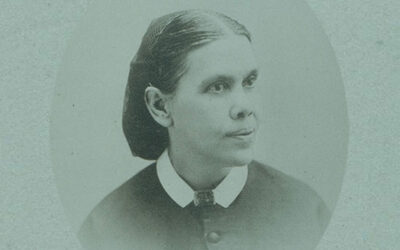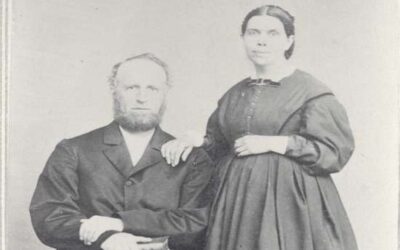Yes, the Old Testament is important because it kicks off the story that is continued by the New Testament. Without it, we wouldn’t have the vital background to Jesus’ first coming and the other accounts of the New Testament.
It’s natural for us as Christians to want to focus on the parts of the Bible that talk about Jesus’ life and sacrifice on the cross.
But without the foundation of the Old Testament, we risk misunderstanding some crucial things Jesus said and did.
This page will help you avoid those misunderstandings and understand how essential the Old Testament is. We’ll cover:
- The Old Testament matters because it’s the Word of God
- The Old Testament is the foundation for the New Testament
- 5 steps to study the Old Testament stories
Let’s first look at why this part of the Bible still matters.
The Old Testament matters because it’s the Word of God

Photo by Tim Wildsmith on Unsplash
The Old Testament, which makes up about 75% of the Bible, was inspired by God. It’s His message to us—just as much as the New Testament is. Here’s what the apostle Paul had to say about it:
“All Scripture is given by inspiration of God, and is profitable for doctrine, for reproof, for correction, for instruction in righteousness” (2 Timothy 3:16, NKJV).
When Paul wrote these words, the Old Testament was the only Bible.
Similar to Paul, Jesus recognized the lasting importance of the Old Testament. In Matthew 5:17–18, He specifically said His purpose was not to “destroy [do away with] the Law or the Prophets” (NKJV). The Law and the Prophets were terms used by the Jews to refer to different sections of the Hebrew Scriptures—their Bible.
After His death and resurrection, Jesus used the same Scriptures to show His followers that His sacrifice had been foretold by the prophets (Luke 24:27). And in His own words, all the Scriptures testify of Him (John 5:39).
If Jesus thought the Old Testament was significant in revealing Himself, then we too can better understand Him through the whole story of the Bible.
The Old Testament is the foundation for the New Testament
To understand the importance of the Old Testament, we have to realize that the Bible is a narrative from the creation of the world in Genesis all the way to the end of the world and its re-creation in Revelation. The New Testament completes that story, and over 10% of its contents are quotes from the Old Testament.1
Thus, it wouldn’t make any sense alone. The Old and New Testaments are inseparable.
Think about it this way:
If you were sitting down to read a book, you wouldn’t start it in the middle, would you?
It’s no different with the Bible.
If you start most of the way in, you won’t have any idea who Abraham and Moses are. Jesus’ allusions to the Israelites and other accounts in the Old Testament won’t make sense. And you wouldn’t even know why He had to come in the first place.
But seen as a whole story, the details fall into place—including the foundational details of life.
It answers basic life questions
The Old Testament answers the age-old questions humans have always wondered about:
- Why are we here?
- Where did we come from?
- And how did we get into such a mess?
Genesis 1–3 shows us a God of love who created this earth and made humans in His image to rule over it. Being formed by the very hands of God gives our lives incredible value and meaning.
God placed the first couple, Adam and Eve, in the Garden of Eden, where He provided for their every need—physical, mental, social, and spiritual. They could have lived forever in selfless love and harmony with one another. And in face-to-face connection with God.
But for love to exist, God also had to give humans free will—the choice to follow His ways or not (Genesis 2:16–17).
Sadly, Adam and Eve chose to disobey God and believe the insinuations about Him (Genesis 3:1–5). By choosing a knowledge of evil, they experienced relational breakdown immediately—with one another and with God. They plunged our world into the chaos, suffering, and pain we see today.
But God didn’t give up on humans at this point.
He set in place a plan to send a Deliverer, someone who would show us who God really is and free humans from the mess they’d gotten themselves into.
It foreshadows Jesus Christ

Photo by Tim Wildsmith on Unsplash
The New Testament is all about Jesus coming to this earth as our Savior. But the Old Testament helps us to see why we need that Savior.
After detailing the Fall of humanity, it shows us how God gave a special promise, called a covenant, to send a Deliverer and to restore His people. He longs to be reconnected with us.
He made this covenant with many people—Noah, Abraham, Isaac, Jacob, and then the nation of Israel, His chosen people who would share the truth of the Messiah with all nations. As a part of this covenant, He also gave them a special sanctuary, or temple, that foreshadowed how God would bring an end to sin and be with His people once again (Exodus 25:8). God instructed the people to make animal sacrifices for sin, symbolizing how Jesus would come and die for the consequences of our sins (John 1:29).
God remained faithful to His end of the covenant, but often, the Israelites drifted, or outrightly turned from God.
But God didn’t throw up His hands in disgust.
Instead, He was patient with His people, sending prophets to guide them, warn them, and remind them of the coming Messiah.
That’s why the Old Testament contains hundreds of prophecies that identified who the Messiah would be and what He would accomplish.
Here are just a few examples:
- Isaiah 53 and Daniel 9:24–27 both prophesied the sacrifice Jesus would make to pay the penalty for sins.
- Micah 5:2 foretold the name of the town Jesus would be born in.
- Isaiah 7:14 revealed who Jesus would be born to.
- Psalm 78:1–2 predicted that Jesus would tell parables.
- Isaiah 6:9–10 describes how people would struggle to believe what Jesus taught.
- Psalm 22 predicted the events of Jesus’ death.
- Psalm 16:10 speaks of His resurrection.
The fulfillment of these prophecies in the New Testament gives us another reason to spend time in both the Old and New Testaments of the Bible. More on that next.
It gives us confidence in God
As we see how the Old Testament prophecies came true, we gain confidence in God as a keeper of His promises. His Word is reliable.
Many of the prophecies—over 300 of them—had to do with Jesus. And there were others too:
God promised Noah that He would save him and his family from the flood. As a result, Noah’s family survived the global catastrophe and rebuilt society and civilization afterward (Genesis 6–9).
Then, God promised Abraham that his family would be numerous, despite the fact that he was old and childless and his wife was infertile (Genesis 15:1–6). Indeed, God gave Abraham a son, who became the nation of Israel and whose family line would eventually lead to Jesus. Through Jesus, Abraham became a spiritual father to everyone who chooses to follow God (Galatians 3:29).
And then there are some of the incredible prophecies in the book of Daniel, such as the 70-week prophecy and the 2,300-day prophecy, all of which have come to pass (Daniel 8–9).
Seeing the fulfillment of the things God promised helps us to have faith in the other things He has told us. We can trust that He will be faithful to His Word.
Because God is not just the God of the people in Bible times.
He wants to be our God today.
Let’s look at how we can study the Old Testament in a way that is relevant to our relationship with Him in the here and now.
5 steps to study the Old Testament stories
The Old Testament may seem a little more challenging to read than, say, the Gospels. But it doesn’t have to be. When we keep the narrative arc of Scripture in mind, remembering that the Old Testament is just the first part of the story, we’ll better see God’s plan and how we fit into that picture.
Here’s how you can get started:
1. Choose a passage

Photo by Tim Wildsmith on Unsplash
Decide on the passage you want to study. You could pick a book, a chapter, or a story you want to follow.
Where you start doesn’t really matter, but if you’re new to the Bible, consider starting in Genesis to get the whole picture from the beginning. Genesis contains mostly narratives, which also make it an engaging read.
The Old Testament contains 39 books of the Bible that are divided into five sections:
1. The Five Books of Moses (also called the Law or the Torah): From Genesis to Deuteronomy, these books cover the origins of this world, early history, and the experiences of Israel. Leviticus and Numbers contain laws that God gave to Moses for the people of Israel.
2. History: Consisting of twelve books from Joshua to Esther, this section encompasses the history of Israel, starting with their conquest of Canaan and going all the way to their captivity and release.
3. Wisdom or Poetry: This section, from Job to Song of Solomon, contains songs, proverbs, and other inspiration.4. The Major Prophets: These books go from Isaiah to Daniel and cover major predictions written to the declining and captive Israelites.
5.The Minor Prophets: The minor prophets (Hosea through Malachi) are smaller books with prophecies for Israel, Judah, and even the surrounding nations. Many of them plead with the people to turn back to God.
2. Take note of details
As you read your passage of choice, notice things that are emphasized or repeated throughout it (you may even want to write them down). And ask yourself these questions:
- What’s the setting of the story?
- What events happened before and after?
- Who are the main characters?
- What’s the plot?
- What’s the narrator’s point of view?
One thing to remember is that the Old Testament contains many typologies. Typologies are events or people that represent future events or people.
For example, Adam was a typology, or type, of Jesus (Romans 5:14–15). Elijah was a type of John the Baptist (Matthew 17:11–13). And the way the Israelites left Egypt and went through the Red Sea parallels the way Jesus came from Egypt and was baptized when beginning His ministry.
These are just a few to get you going. Keeping an eye out for these typologies can be an intriguing activity as you read.
3. Understand the context
A passage might seem to indicate one thing when you read it on its own, but it could mean something entirely different when you understand the big picture—the whole story of Scripture.
For instance, the ceremonial law of Moses and guidelines given to the Israelites seem pretty strange. And you may wonder why God gave these laws. Why were some of the punishments so harsh, and why did God give instructions about war?
The key is recognizing that these laws were God’s way of working with a people who had come out of slavery and had lost sight of what it means to live by His law of love.
They needed specific guidance to transition into God’s ideal.
We see God’s ideal in the first couple chapters of Genesis: a world based on His law of love. But because of humanity’s fall into sin, God has to find ways to deal with the sinful situations humans get themselves into.
Sometimes, those methods may not reflect God’s ideal, but they’re the best way to get us back to that ideal.
Another aspect people struggle with is the way God is sometimes portrayed in the Old Testament. He may seem judgmental or wrathful—and not like the Jesus of the Gospels.
In this case, we have to keep in mind that God doesn’t change between Malachi and Matthew.
What we see in Jesus is a reflection of God (John 14:9).
And even in the Old Testament, God is merciful, forgiving, and compassionate, just like Jesus (Exodus 34:6–7; Psalm 86:15). His greatest longing was to free His people from sin and its harmful consequences so that He could reconnect with them.
At times, this longing may come across as “tough love,” but it’s ultimately God navigating sin and evil to bring us back to the best world possible.
4. Look for God’s perspective
Just because something happened in a Bible account doesn’t mean God approved of the action.
After all, it contains stories of people who did things that were immoral, violent, and downright disgusting—such as violence, murder, and rape.
But this doesn’t mean God approves of such actions. The Bible writers were simply describing the events that happened—not endorsing them.
As you read some of these accounts, try to figure out God’s perspective on the situation. What did He think about the actions of the characters?
If it isn’t clear in the story, it helps to back up and remember the big picture: God is dealing with evil to bring us back to His ideal of other-centered love.
5. Apply the principles to your life
Don’t miss this step! Here is where the things you’ve read and noted can now be applied to your life in practical ways.
You may want to answer some of these prompts:
- What principles can you draw from the story? Was there a promise to claim, an action to take, or an action to avoid?
- What are some practical takeaways that could be relevant to your day-to-day life?
- How did the story shape your picture of God?
Fresh insights from an old book
The Old Testament is more than just a collection of history books. It is crucial to understand God’s ultimate purpose for humanity and His promise to restore our connection with Him. It lays the foundation for Jesus’ life and ministry and gives a glimpse into how God is dealing with sin.
And its lessons can still guide our lives today. As you ask the Holy Spirit to be with you in your reading, He will impress your heart with its freshness and relevance for daily life.
To dig deeper into the themes in the Old Testament and the picture of God we find there, head over to our intro guide to the Old Testament.
Choose an Online Bible Study
Want to keep learning? Find out more about Jesus, humanity, the plan of salvation, and how God loves you enough to sacrifice everything, just to give you a chance to choose Him.
Sometimes it can be hard to know where to start, that’s why we offer free, user-friendly, online Bible study options you can do anytime, anywhere, and at your own pace.
This online Bible school will take you through the major themes of Scripture, breaking down the Bible’s complex concepts into bite-sized pieces, which can lead you toward the answers of life’s more challenging questions.
- Nicole, Roger, “New Testament Use of the Old Testament,” reproduced from Revelation and the Bible, ed. Carl. F. H. Henry (Grand Rapids, Baker, 1958), pp. 137–151. [↵]
Related Articles
More Answers
What Is an Adventist Medical Missionary?
A medical missionary in the Adventist Church is someone who cares for the medical needs of people as a way of showing the love of Jesus. They may travel to another country, or even just serve in their hometown.
Is the Seventh-day Adventist Church Protestant?
With so many Christian denominations, it can be hard to keep track of which ones share which beliefs. Let’s look at the core Protestant beliefs of Adventism.
The True Events Surrounding the Birth of Jesus
Jesus’ birth involved many strange events: a pregnant virgin, a stable birth, angels appearing to shepherds, and wealthy visitors. These help us understand His supernatural yet incredibly humble life.
Are Seventh-day Adventists Evangelicals?
According to its origins and definition, evangelicalism is about following Jesus and the Bible and sharing the Gospel through the way we live our lives. Adventists wholeheartedly harmonize with these principles.
Could Anything Keep Me from Becoming an Adventist?
We are each saved through Christ. But when it comes to church membership, are there certain beliefs or expectations to become an Adventist?
Do Seventh-day Adventists Have “Rules”?
We uphold principles we believe will help us maintain a closer relationship with Jesus and His Word. Learn how these principles guide Adventist lifestyles.
Your Comprehensive List of Ellen G. White’s Visions
Ellen White—an author, health-reform advocate, Bible scholar, and one of the most influential founding figures of the Seventh-day Adventist Church—was blessed by the Holy Spirit with the spiritual gift of prophecy (1 Corinthians 14; Romans 12:6-8). During her lifetime, she received direct guidance and inspiration from God in several different ways.
Do Seventh-day Adventists Have “Rules” For Marriage?
Around the world, many cultures and religions have various marriage traditions, expectations, or even rules when it comes to choosing a partner, planning the wedding, extended family logistics, or a number of other things.
An In-Depth List of the Prophecies About Jesus
How many prophecies of Jesus are in the Old Testament?
Can a Seventh-day Adventist Marry a Non-Adventist?
Yes. Seventh-day Adventists are not under any official rules that dictate who they can or cannot marry. This is a personal, life-altering decision between the couple and God.
What Adventists Believe About Alcohol and Tobacco Use
The Seventh-day Adventist Church has historically discouraged the use of alcohol and tobacco. Even before the church started in 1863, its leaders were realizing the negative effects of these substances.
What Does the Bible Say About Aliens and UFOs?
In 1938, aliens and UFOs were the subject of a mass prank. Around Halloween, Orson Welles performed a radio adaptation of H.G. Wells’ War of the Worlds. This ended up causing a panic throughout the United States—many people took it to mean that aliens had really attacked New Jersey.
What Do Adventists Believe About the Authority of the Bible?
Learn how one really old book (the Bible) is the sole foundation for all Seventh-day Adventist beliefs.
Is the Soul Immortal? Exploring What Adventists Believe
Based on the way the Bible describes humanity in comparison to God and angels, Seventh-day Adventists believe souls are not something you have, but something you are.
Jewelry—Why Do Many Seventh-day Adventists Choose Not to Wear It?
If you walk into a Seventh-day Adventist church service, you might notice that many people aren’t wearing earrings, bracelets, necklaces, or sometimes even wedding rings.
How the Bible Defines Love
Everyone talks about it, but do we really know what it means?
Why Does God Allow Suffering?
Poverty, genocide, a school shooting. A tsunami or earthquake that wipes out thousands of lives and leaves behind mourning family members.
International Pathfinder Camporee
Youth aged 10-15 in the Adventist Church’s global Pathfinder program look forward to the International Camporee every 5 years. This event brings together Pathfinders from around the world for exciting activities.
What Is Peter’s Ladder of Virtues, and How Does It Work?
Peter’s ladder of virtues is a phrase that refers to eight characteristics to be developed as a person grows in their relationship with Jesus Christ. It can be found in 2 Peter 1.
How Adventists interpret Bible prophecy
Bible prophecy conjures up a variety of emotions in people. For some, it feels exciting or mysterious.
What Counts as “Work” on the Sabbath?
God designed the Sabbath day to be a 24-hour period when we could pause and enjoy the goodness of His creation. We do this by putting aside our regular work so we can focus on spending time with Him and appreciating what He’s created (Exodus 20:8-11).
Moviegoers’ Guide to The Hopeful: The Facts Behind the Film
Learn where and when you can watch The Hopeful and how to get tickets. Already seen it? We’ll uncover the real story that inspired this film.
Protestant Reformation
Martin Luther. The 95 Theses. The Reformation. The Protest. Maybe you’ve heard these terms and wondered, What’s the big deal?
Ellen G. White’s Lasting Legacy
Ellen G. White is a well-known name among Seventh-day Adventists, but she also made an impact in many other parts of history, aside from being a co-founder of the Adventist Church.
Ellen G. White’s Challenging Health Journey
When it comes to lifelong struggles with health, Ellen White is no stranger. In fact, health challenges set the tone for her life early on—years before she was involved in co-founding the Seventh-day Adventist Church.
“What Was Ellen and James White’s Marriage Like?”
Ellen and James White, cofounders of the Seventh-day Adventist Church, met and married under somewhat unusual circumstances. But it’s a sweet story of partners in ministry becoming partners in life. And their married life continued to center on furthering the spread of the gospel together.
What Do Adventists Believe About the Mark of the Beast and 666?
It’s a popular topic, especially during tumultuous times. When everything around you feels chaotic, it’s easy to wonder about the end of the world, and topics like the mark of the beast, as mentioned in Revelation 13, can stir up uneasiness.
What is the Ellen G. White Estate?
What is the Ellen G. White Estate?Ellen G. White’s contributions to the formation and growth of the Seventh-day Adventist Church are an integral part of its history. As a significant co-founder of the denomination, her writings provided millions of people with...
Getting to Know Mark—Gospel Writer and Follower of Jesus
Mark (whose full name was John Mark) had a lot of roles in the New Testament: he was an early follower of Jesus Christ, he traveled the Mediterranean as a Christian missionary, and he wrote a book of the Bible.
Didn’t find your answer? Ask us!
We understand your concern of having questions but not knowing who to ask—we’ve felt it ourselves. When you’re ready to learn more about Adventists, send us a question! We know a thing or two about Adventists.
































